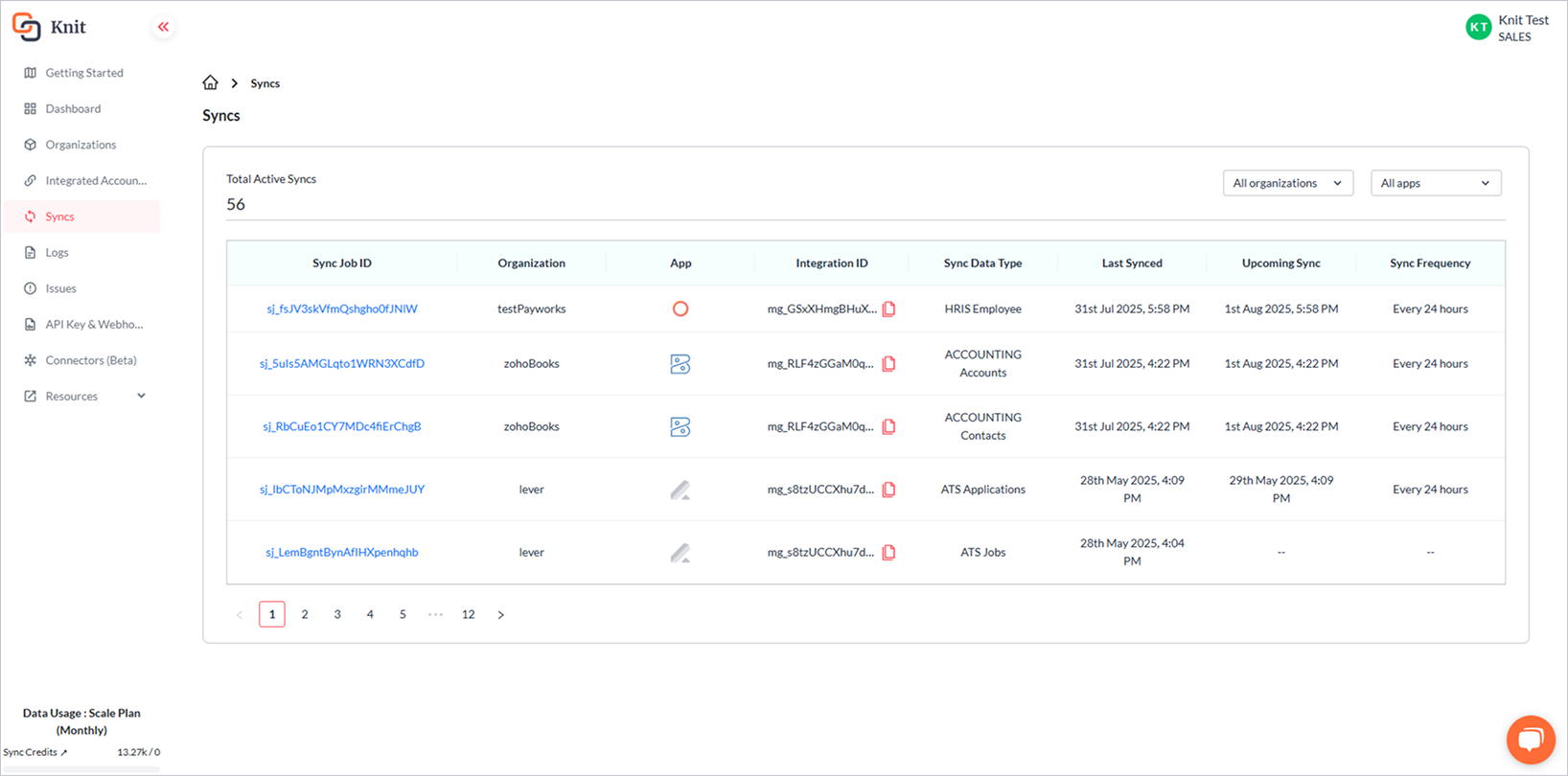HRIS
Streamline Candidate Sourcing into Your ATS
Knit lets you automatically sync candidates from external sources or sourcing tools into your ATS — so recruiters have all profiles in one place, without manual effort
Overview
Recruiters often source candidates through multiple external platforms — job boards, freelance recruiters, referrals, or sourcing tools — but getting that data into the ATS is often manual and error-prone. Knit automates this process by capturing candidate data from external sources and sending it directly into your ATS like Greenhouse, Lever, or Workable, keeping your hiring funnel centralized and clean.
✅ Who Benefits
- Recruiters & Talent Teams: No more switching tabs to manually copy candidate data — profiles land in the ATS instantly
- HR Operations: Improves data consistency, ensures every profile is trackable, and maintains compliance
- ATS Product Teams: Integrate with dozens of sourcing tools faster via Knit’s unified API layer
- Engineering Teams: Save time building and maintaining one-off integrations with job boards or sourcing platforms
✅ When to Use
- When candidates are sourced manually or semi-automatically from platforms like: LinkedIn, Hired, AngelList, Instahyre, Naukri, GitHub, or job fairs
- When working with third-party recruiters or agencies
- During high-volume hiring campaigns or when launching new roles in different locations
- To reduce drop-off caused by delayed or lost candidate data
Implementation Details
Knit captures candidate data from sourcing tools or job boards, maps it to your ATS format, and automatically creates candidate records in your ATS. You can customize field mappings, link candidates to specific job roles, and trigger actions — all via a unified, no-code workflow.
Step 1: Capture Candidate Data from Source Tools
Knit connects with external tools or listens for webhook events when a new candidate is found. It extracts structured data such as name, email, job title, location, and resumes — giving you clean input data ready for mapping.
// Type some code ->
console.log "oO08 iIlL1 g9qCGQ ~-+=>";
// â é ù ï ø ç à Ē Æ œ
function updateGutters(cm) {
var gutters = cm.display.gutters,
__specs = cm.options.gutters;
removeChildren(gutters);
for (var i = 0; i < specs.length; ++i) {
var gutterClass = __specs[i];
var gElt = gutters.appendChild(
elt(
"div",
null,
"CodeMirror-gutter " + gutterClass
)
);
if (gutterClass == "CodeMirror-linenumbers") {
cm.display.lineGutter = gElt;
gElt.style.width = (cm.display.lineNumWidth || 1) + "px";
}
}
gutters.style.display = i ? "" : "none";
updateGutterSpace(cm);
return false;
}Step 2: Transform and Map to ATS Format
Each ATS has its own format for candidate data. Knit helps you map fields (like resume_url, role, location) to the expected structure of the destination ATS using visual rules or simple configuration — no dev effort required.
// Type some code ->
console.log "oO08 iIlL1 g9qCGQ ~-+=>";
// â é ù ï ø ç à Ē Æ œ
function updateGutters(cm) {
var gutters = cm.display.gutters,
__specs = cm.options.gutters;
removeChildren(gutters);
for (var i = 0; i < specs.length; ++i) {
var gutterClass = __specs[i];
var gElt = gutters.appendChild(
elt(
"div",
null,
"CodeMirror-gutter " + gutterClass
)
);
if (gutterClass == "CodeMirror-linenumbers") {
cm.display.lineGutter = gElt;
gElt.style.width = (cm.display.lineNumWidth || 1) + "px";
}
}
gutters.style.display = i ? "" : "none";
updateGutterSpace(cm);
return false;
}
Step 3: Create Candidate in ATS
Once data is formatted, Knit sends it to the correct ATS endpoint, either to create a new candidate record or to update an existing one. You can also choose to auto-link the candidate to a job role or mark as sourced.

Key Data Models and APIs
These APIs eliminate the need to build and maintain separate integrations for each ATS platform like Greenhouse, Lever, Workable, and others. Instead of dealing with different data formats, authentication methods, and API quirks, you can rely on Knit’s unified API layer to standardize and simplify how you connect, manage, and sync candidate data across all your hiring tools.
Wrapping Up
Sourcing candidates shouldn’t be a manual, error-prone process. With Knit, you can automate the entire flow — from capturing profiles to syncing them into your ATS — saving your team time and ensuring every candidate is tracked from the start.
Get started now and book a demo with our team!
Built for Scale, Speed,
and Simplicity
Knit gives you everything you need to launch, manage, and grow integrations effortlessly.
Unified API for 100+ Apps
Connect once, access all. Knit gives you a single API to integrate with 100+ HR, payroll, ATS, CRM, and ERP systems
No-Code Workflow Builder
Build powerful workflows without writing a line of code. Knit lets you automate integration logic across 100+ apps—visually
Bi-Directional Sync
Keep data in sync across systems. Knit enables real-time, two-way sync between your apps—so updates flow both ways
AI Connector Builder
Build custom connectors with AI. Knit helps you generate and configure new integrations—faster, with less code





